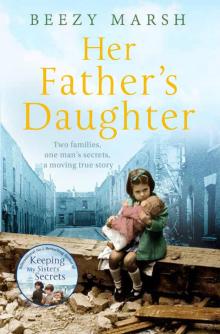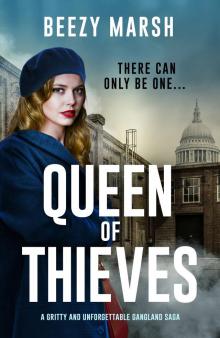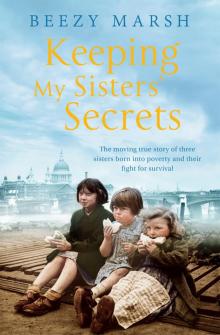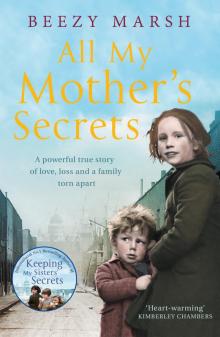- Home
- Beezy Marsh
Queen of Thieves
Queen of Thieves Read online
For my friends.
Queen of Thieves
Beezy Marsh
Contents
Dedication
Title Page
Prologue
Chapter One ALICE
Chapter Two NELL
Chapter Three ALICE
Chapter Four NELL
Chapter Five NELL
Chapter Six ALICE
Chapter Seven NELL
Chapter Eight ALICE
Chapter Nine NELL
Chapter Ten ALICE
Chapter Eleven NELL
Chapter Twelve NELL
Chapter Thirteen ALICE
Chapter Fourteen NELL
Chapter Fifteen ALICE
Chapter Sixteen NELL
Chapter Seventeen ALICE
Chapter Eighteen NELL
Chapter Nineteen ALICE
Chapter Twenty NELL
Chapter Twenty-One ALICE
Chapter Twenty-Two NELL
Chapter Twenty-Three NELL
Chapter Twenty-Four NELL
Chapter Twenty-Five ALICE
Chapter Twenty-Six NELL
Chapter Twenty-Seven NELL
Chapter Twenty-Eight ALICE
Chapter Twenty-Nine NELL
Chapter Thirty NELL
Chapter Thirty-One NELL
Chapter Thirty-Two ALICE
Epilogue NELL
ALICE
Author Note
Acknowledgements
About the Author
Also by Beezy Marsh
Copyright
PROLOGUE
London, June 1953
The sleek sable wrap feels so sumptuous between my fingers, I simply can’t resist it.
The fur is heavenly and soft; it’s exactly what I’m looking for. The whole street is going to be dolled up to the nines for the Coronation Party and I don’t want to disappoint because I’m royalty too; Queen of my manor, that is.
The minute the shop assistant’s back is turned, I snatch it from the rail and begin to roll it, quickly, into a tight, furry bundle.
I yank open the baggy waistband of my skirt and shove the wrap down the leg of my knickers. They are voluminous, real passion killers, with elastic at each knee, designed with one purpose in mind: going shopping.
Clouting, we call it, and I’m the best in the West End of London, stepping away from that clothes rail as if I haven’t a care in the world.
It hasn’t always been this easy; I’ve had my fair share of close shaves, especially in the early days, when I was learning my craft. Even now, the thrill of stealing mingles with a fear of being tumbled by the shop staff, which makes my hands clammy.
Being a thief wasn’t the career I had in mind when I was growing up but if there’s one thing I’ve learned, it’s that you never know the way your life is going to turn out.
By the time I left school, I’d never even pinched so much as a sherbet lemon from the pick ’n’ mix at Woolworths.
All that changed after we won the war.
Victory tasted sweet but as I soon found out, it couldn’t stop the hunger pangs. Beating Hitler was one thing, but Britain was broke.
Rationing got worse and before you knew it, most folks were taking a bit of crooked, just to make life more bearable. It was all well and good for politicians to tell us not to grumble but they never went short, did they?
Wherever you looked there were bomb craters and piles of rubble. Weeds and wildflowers sprung up among the ruins, and excited kids claimed bombsites as their playgrounds, no matter how many times their mums told them not to. Life went on but there was little or no money to rebuild.
In London, battered by war but bursting with people hungry for some fun and what little luxuries they could afford, the black-marketeers and their bosses saw a golden opportunity.
After all, gangland was a man’s world.
That’s what they thought.
But us women, well, we knew different.
This is our story.
Chapter One
ALICE
Waterloo, London, June 1946
When we won the war, I didn’t know whether to laugh or cry.
I was sad to see the back of the blackout because, to be honest, losing it was bad for business.
Night in the city was paradise for me and my girls. We made good use of the cloak of darkness to shift the stuff we’d brought home from the shops during the day. Now the gas-lamps were shedding light on things I wanted to keep hidden and that made life more difficult.
We’d got used to running the gauntlet of an air raid warden or two in the Blitz and when the siren went, you’d get some funny looks scurrying off to the Underground with bags stuffed full of finery, with a mink stole slung about your shoulders. But I’d be damned if I was going to let a German bomb deprive me of the spoils of a hard day’s work.
But with the blackout gone, there was more risk of being tumbled.
Round our way, most folks have always known better than to ask too many questions, no matter what they saw coming and going from my flat. They’re happy enough to pay for a bit of stuff on the side when they need it, especially if it means they don’t have to keep slapping gravy browning on their legs, because I’ve got them some nice new nylons.
And if anyone feels compelled to talk to the law about me, well, let’s just say they’ll soon realise that my jewels aren’t just for show. Diamonds are hard, and they can come in handy as a knuckleduster when you have enough of them. I wear one on every finger. Alice Diamond by name and diamond by nature, as I like to say.
You can call me a thief, but I prefer to say I’m a hoister. I liberate clothes from shop-rails and coat hangers and find them a good home. Perhaps I’ll give a working-class girl a chance to shine in a dress that she could never dream of affording, never in a month of Sundays. However, after a particularly busy Monday spent in the West End of London, I can make all her dreams come true, for a fair price, given the risks I’m taking.
Shoplifting with my gang, The Forty Thieves, is a proper career, with skills honed over years; a tradition that’s passed down by word of mouth, from one generation to the next. I get teary-eyed when I think of it really, because we can trace our heritage all the way back to the days of good old Queen Victoria herself.
I bet she could have stashed quite a few furs in her bloomers, given the size of her Majesty. I could have made good use of those when I was out shopping.
No offence, Ma’am.
It’s a year to the day since the war ended and everyone’s having another knees-up for the Victory Parade but I ain’t exactly in the mood for a party.
Everything but the air we breathe is still on coupons. Make do and mend, Mrs Sew-and-Sew, clothing on the ration; forgive me for saying, but those things are for mugs who want to wear moth-eaten jumpers and go around with holes in their stockings. And don’t get me started on the utility dresses they’ve still got in the shops. I wouldn’t be seen dead in them. What kind of victory is that?
It’s a matter of pride that no matter how hard-up I am – and believe me, there have been times I’ve been down to my last brass farthing – I’ve still kept up appearances, just like the quality over the water in Mayfair. The posh folk might say we are all in it together, but they’re not going without like we are. They ain’t fooling me, not for a minute.
I can honestly say, everything about me, every stitch I’ve got on, is crooked. But I’ve worked hard for it, just the same; harder than quite a few blokes I could mention, who spend their wages down the pub and leave the missus short for the housekeeping. Talk about doing an honest day’s work! And what with the prices of things in the shops these days, it’s hard to say who’s robbing who when you pay for things at the till. Not that I’ve don
e that very often, but at least I’m truthful about it.
And don’t go thinking I’ve lost touch with my roots, even if I am dolled up in my finery. Some of my best contacts are people you wouldn’t bat an eyelid over if you met them in the street.
The flower seller at Waterloo station looks like nothing more than an old drunk but she’s sharp as a tack. She’s called Lumps and Bumps because she’s always falling down and hurting herself when she’s been on the sauce but she’s my eyes and ears in that neck of the woods. Old Lumps has the alarming habit of warming the cheeks of her arse by the fire in the local boozer and she doesn’t wear knickers either, so that sight is not for the faint hearted. Her skirts haven’t been washed since the General Strike, I’d wager. Her teeth are like moss-covered tombstones and her breath reeks, but I always listen closely because her tip-offs are pure gold.
Last week, she heard that a couple of girls from Waterloo had got a little ruse going where they were knocking off some rolls of silk from the cloth factory by winding it around themselves and waddling out of work like a pair of Egyptian mummies. They made a pretty penny, but they forgot to pay me my dues, so I’m in the neighbourhood to see what I can find out about them, before I plan my surprise visit. Anything crooked on this side of the water, on my manor, goes through me and that’s that.
I just need to remind them who’s the Queen of Thieves round these parts and then we can all be friends. I’ve brought my silver-topped cane to make that point and Molly, my second-in- command, has her hatpin, just in case. She’s quite handy with it when she needs to be.
Meanwhile, there’s time a for a quick drink their local, The Feathers, just in case they happen to be there. I’ve a packet of stockings to drop off for the landlord’s daughter, and he owes me for those.
It ain’t my usual neck of the woods, I’m from round the Elephant and Castle, but I like to keep an eye on things, just to let people know I survived the Blitz, in case they were wondering where I’d got to.
I’m sure they’ll all be pleased as Punch to see me.
The row of two-up, two-downs which nestle by the River Thames behind Waterloo Station has quite a reputation but it don’t scare me or my girls. The same can’t be said of the local policemen – cozzers we call them – who will only walk down the streets round there in pairs.
Some tatty bits of Union Jack bunting have been strung between the lampposts and kids are out having fun watching a dog and a rat having a scrap on the cobbles. Some of the older ones are running a book on it. Makes a change from the bare knuckle fights they have on a Sunday at the top of the street; and that’s including the women, who like to settle scores with fists.
There’s quite a gang of us as we walk into the pub, and heads turn. A banner declaring ‘GOD SAVE THE KING!’, last pressed into service a year ago, on VE Day, has once again been proudly displayed above the bar.
An accordion player in the corner squeezes out a few notes of Roll Out The Barrel, to liven things up a little. A few old blokes, nursing their pints and picking their teeth for want of anything better to do, struggle gamely to sing along, and some wisecrack jokes that it sounds as if a cat is being strangled down the back alley, which raises a laugh.
My girls are dressed like film stars, with hair like spun silk gleaming beneath hats of the finest felt, in colours and styles you’d only seen in magazines; not even in shop windows, not since before the war. There’s a dainty blue pillbox with a veil, a derby hat in lime green, a bright beret in zesty orange and the finest of all, my red fedora with enough plumage to make a peacock proud.
Our clothes are nothing like the drab, worn, shapeless utility wear that stalk the streets of Waterloo, on the ration.
Our jackets have nipped in waists and there’s material, extra material, for frills and tucks on the dresses. My girls’ legs aren’t stained with gravy browning either. They wear stockings, silk stockings, and they’re all laughing and joking with each other because the world they come from doesn’t involve making do and mending.
A hush falls over the room, right into the darkest corners, stained yellow by years of tobacco smoke. I could swear the peeling wallpaper wilts a little more at the sight of us.
Men stare at the floor and shuffle their feet, suddenly taking great interest in their bootlaces or the sawdust and fag ends under the tables.
‘It’s quiet as the grave in ’ere,’ I joke to the barman, with a throaty laugh. ‘Someone died, have they? Where’s the party?’
Right on cue, the accordion player starts up again and half the pub starts singing for dear life, as if to please me. Men tighten their ties and flick imaginary dust from their trousers as they make their way over to buy my girls a drink or ask them to dance, or both.
I turn my back on the party and murmur something to the barman, handing over a small package. He nods and pulls a wodge of cash out from under the counter and hands it over. I flick through it briefly before stuffing it into my carpet bag.
Things are livening up a bit now and I tap my silver-topped cane in time to the music, my row of diamond rings twinkling on my right hand.
The barman pours a whiskey and pushes it towards me: ‘It’s on the house.’
As I raise it to my lips, that’s when I spot her, sitting at the end of the bar, looking lost…
Chapter Two
NELL
Waterloo, London, June 1946
I didn’t mean to stare, but I’d never seen anything like it in all my born days.
They were glorious, like exotic animals in the zoo or mouth-watering cakes in the baker’s shop.
Leading from the front, like a ship in full sail in a red fedora hat, was a woman standing as tall as any man. Her face was broad and her piercing green eyes glinted as she scanned the pub, almost willing someone to meet her gaze.
Her black hair was rolled up and set at the front and the sides, to accentuate her rounded features.
This woman caught me gawping at her and gave a little wink: ‘Cheers, love!’
Well, that made me turn scarlet. She must have thought I was a proper nosy mare.
Just then, the barman chipped in: ‘Cheer up, love, it might never happen,’ and pushed a drink my way.
I pulled my old woollen cardigan closer around my middle. As far as I was concerned, it already had. Even at just four months gone, I was showing.
My blouse was straining to contain the new life growing inside me. It wouldn’t be long before people started to notice that I was in the family way. A blush started to creep up my neck at the very thought of it. Our street was a tight-knit place, where the walls were thin as paper and people looked out for each other, or poked their noses in, depending on which way you looked at it.
The whole of my childhood had been overshadowed by two terrors: my dad’s temper and German bombs raining down from the sky.
And now, just as things were supposed to be getting better for everyone, I’d gone and done something stupid and ruined it all.
My stomach lurched at the thought of what Dad would say. The stares and knowing looks from the neighbours were nothing compared to what he’d do to me for getting myself into trouble. He was handy with his belt at the best of times and once he’d hit me so hard with the buckle, he cracked one of my ribs. Mum kept me off school and told the neighbours I had scarlet fever. It was our little secret, and I didn’t breathe a word about it because my parents loved me, and it was all my fault for being so bleeding cheeky in the first place. Dad said so.
But that wasn’t even the worst of it. He had a way of brooding, ignoring me for days when I’d upset him, which was worse than the beatings. It made our two-up, two-down in Tenison Street, just a stone’s throw from the River Thames, feel like a tinderbox. Just opening my mouth to speak could be the spark which set it all ablaze.
The war had sucked every last bit of good humour of out him and there wasn’t much of it to spare in the first place, if truth be told. I’d rarely seen Dad smile, except with his mates down the pub. He was f
orty when the war broke out, too old to fight, and nights spent sheltering on the cold floors of the Underground had played havoc with his lumbago, so he’d volunteered as an air raid warden, which only made him more irritable, mainly about the stupidity of people who failed to observe the blackout. His days were spent loading packing cases full of jam on to lorries at the Hartley’s factory down in Southwark, and his nights were spent grumbling at Mum, finding fault with everything from the way she boiled the potatoes to the lumps in her custard.
Mum spoke in whispers and lived on her nerves, but she was an absolute rock to other women in the street during the long years of the Blitz. She was always there with a cup of tea and listening ear, calmly doing what she could to help. The uncertainty of war was nothing to her, because she’d lived under fire from him indoors for so long anyway. He’d never raised his fists to Mum, not that I knew of, but his anger was volcanic that the aftershocks would continue for days.
The end of hostilities with Germany had brought hopes of a truce with Dad, thanks to the return of his one true passion, greyhound racing. The evenings when he went to have a flutter on the dogs were among the happiest in the house, simply because he wasn’t there.
And then, along came Jimmy.
Jimmy just strolled into my life one summer’s day not long after the war ended, sauntering around the corner, whistling low between his teeth. It was as if the sun that ripened the peaches piled high on his barrow had seeped into him, from the roots of his sandy blond hair to the twinkle in his sky-blue eyes.
His jacket was loose about his shoulders and thrown back slightly, his tie tightly knotted at the collar of a crisp white shirt and shoes polished to a shine.
He was a fixer, someone who could get hold of things, if you needed them, no questions asked. Half the neighbourhood had been in hock to Jimmy at some point but there was no shame in that, it was just the way things were. He was reasonable about repayments and if anyone was daft enough to try to diddle him, it wouldn’t be Jimmy who got heavy, but some fellas sent from the bosses over in Soho. No one could blame Jimmy for that, he was the monkey, not the organ grinder.

 Her Father's Daughter
Her Father's Daughter Queen of Thieves
Queen of Thieves Keeping My Sister's Secrets
Keeping My Sister's Secrets All My Mother's Secrets
All My Mother's Secrets